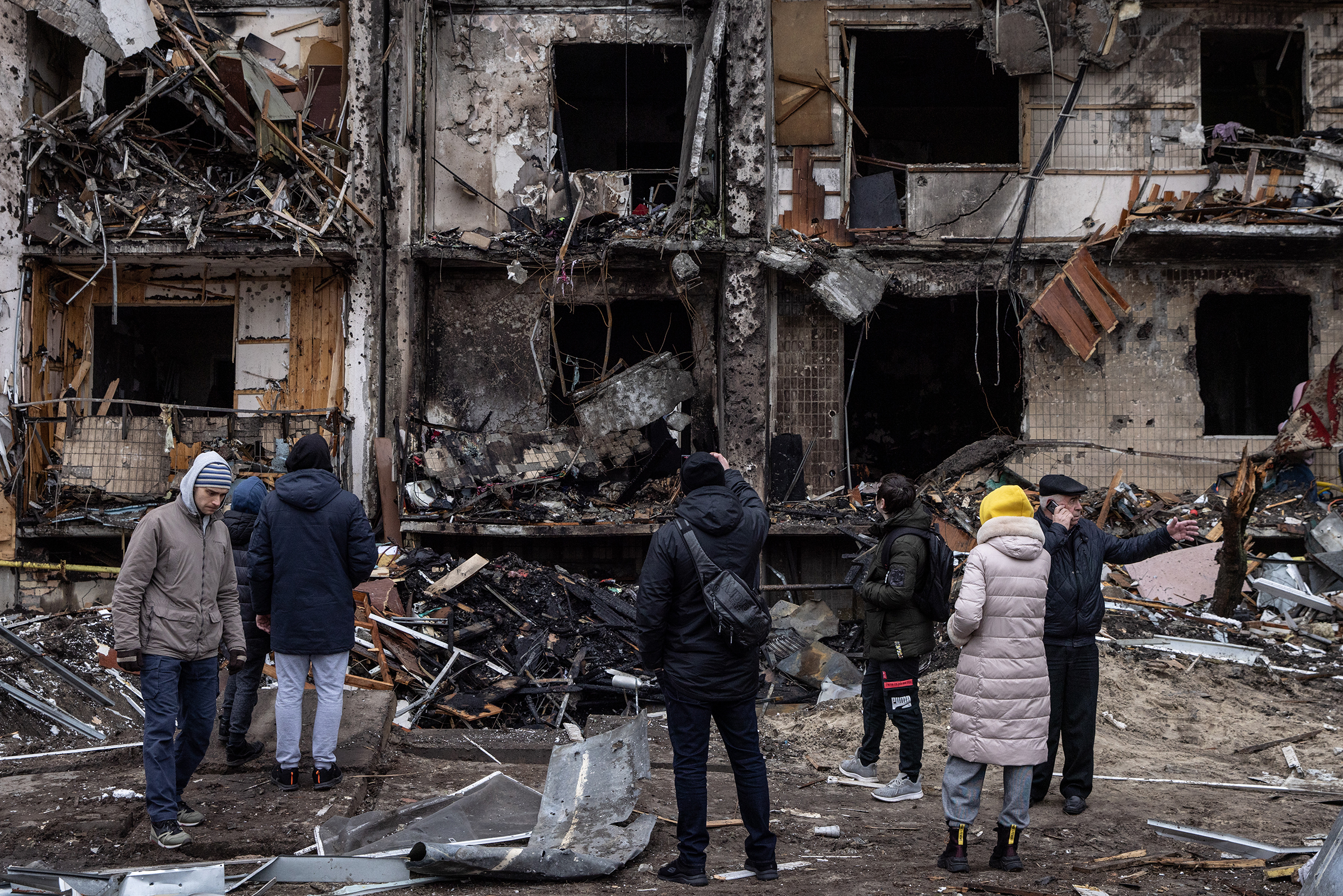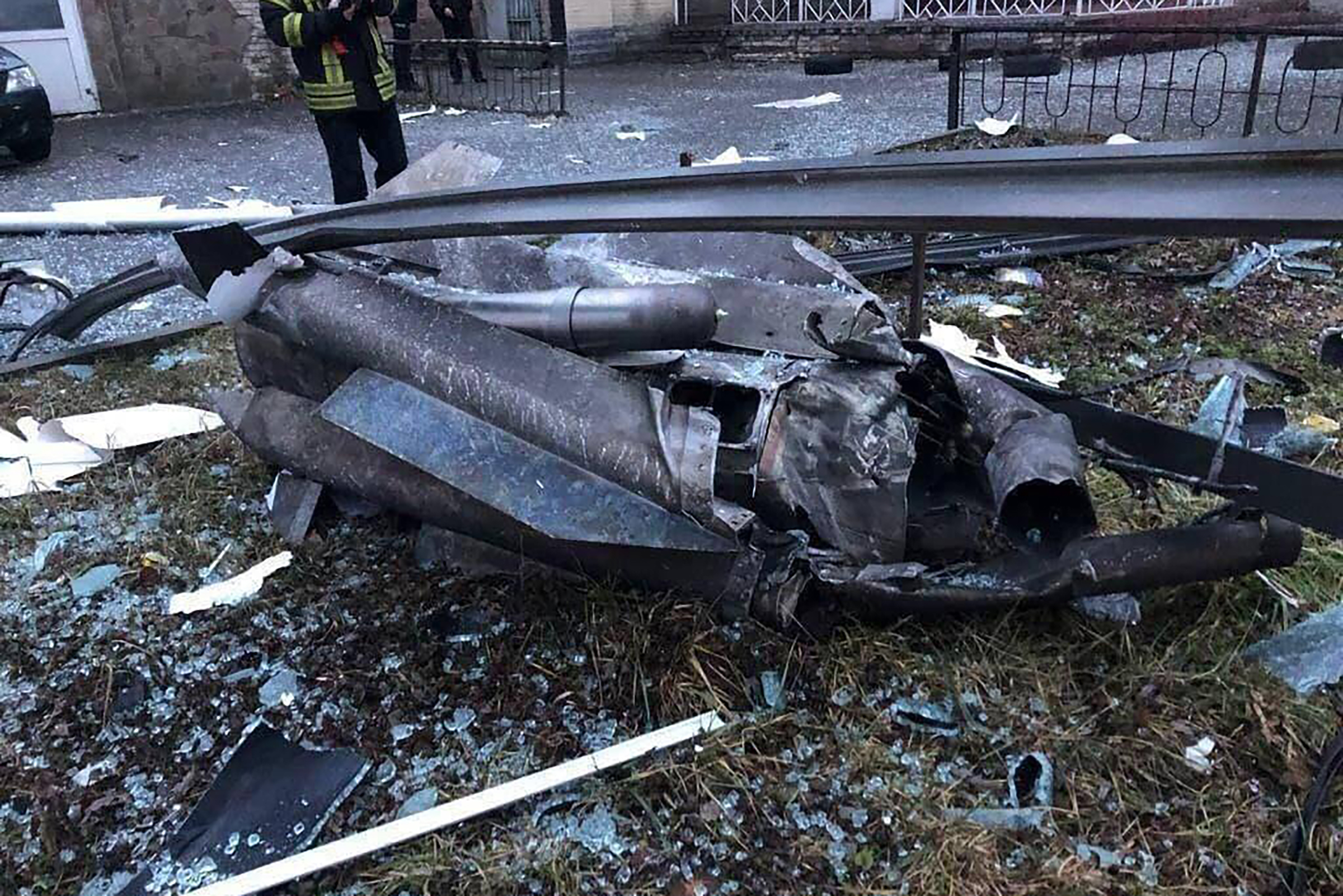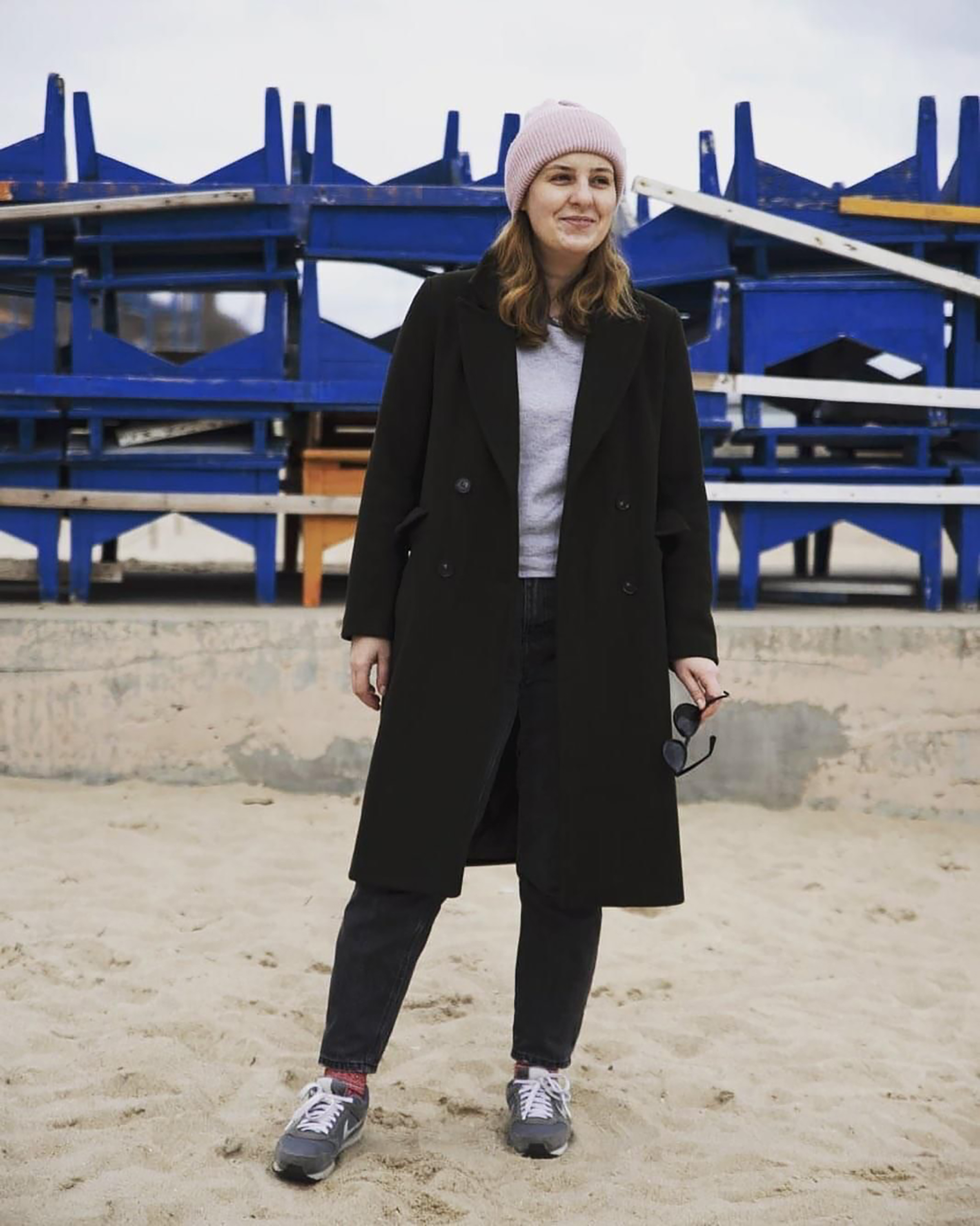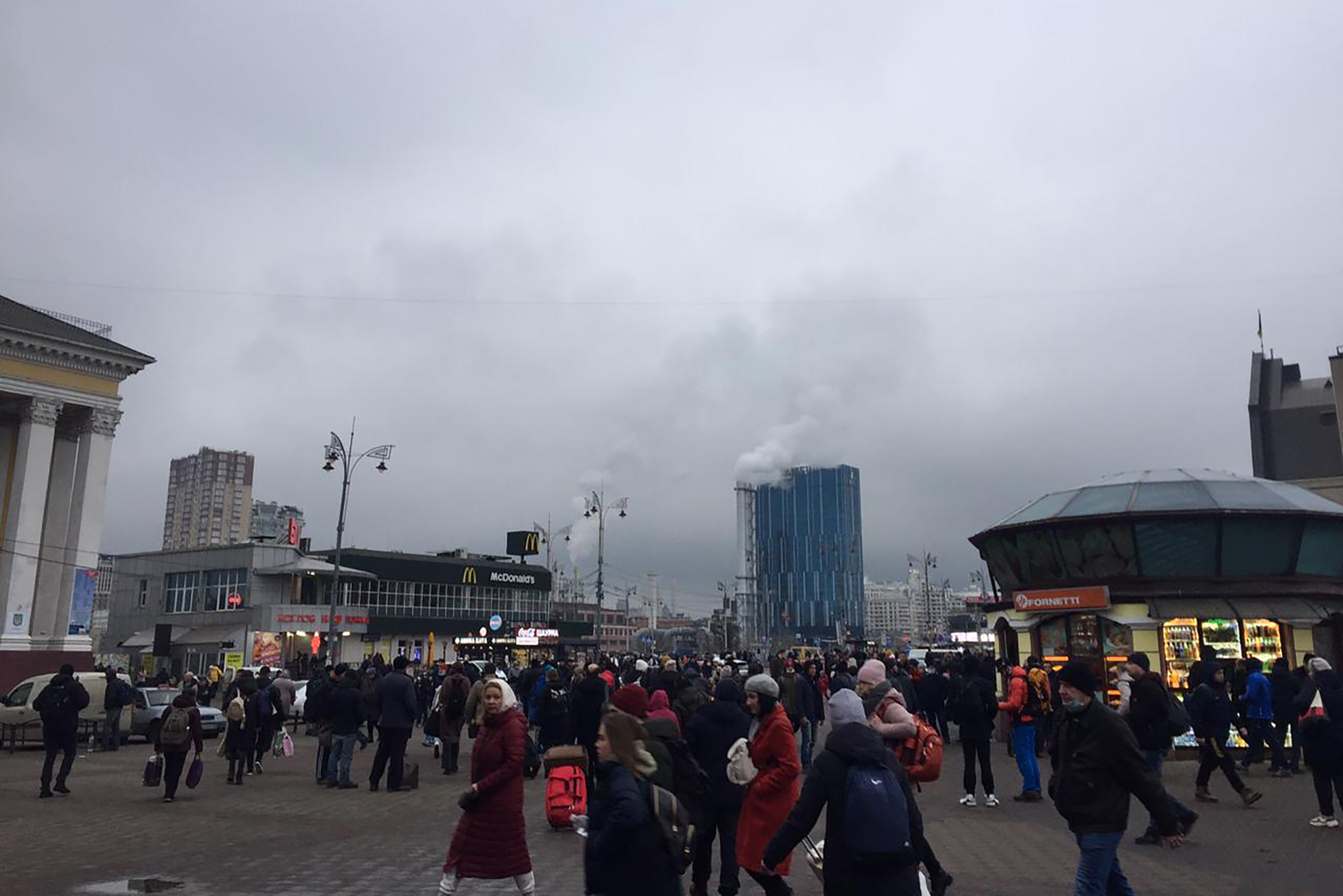
“Mom, the bombing has started.” After a tremendous bang woke me up in the early hours of Thursday morning in Kyiv, I hoped against hope that a thunderstorm was passing by. Still, I wrapped myself up in a blanket and ran to the next room to wake my mother, who is visiting from Odesa. She didn’t believe me at first, but I was trembling and crying.
I opened up Facebook, where a friend had written a post saying, “War! My Ukraine is under attack!” Missiles had rained down across my native Ukraine, including the capital, Kyiv, Odesa on the Black Sea, and other major cities.
We needed to move quickly. I made a snap decision to not use the elevator in our apartment building, and soon my mom and I found ourselves running down 15 flights of stairs. Outside, we passed a group who had clearly been drinking all night and asked them if they’d heard anything. They said there were explosions. My mom was not convinced. “They’re just drunk,” she whispered.
Read More: Putin Wants Revenge Not Just on Ukraine But on the U.S. and Its Allies
Then we saw a missile that had exploded in the front yard of an apartment block near our local shop and subway station. Smashed glass and twisted metal lay strewn across the grass. Russia says it is only targeting military installations across Ukraine, but there is nothing like that here; this is a residential street.
We entered the station, which had been turned into a temporary bomb shelter. The flag of Ukraine was projected from a large electronic billboard. I stood there for several minutes and thought, well, this is it. This is the moment that will decide everything.
After an hour underground, we emerged to see crowds of people going in all directions. Most dragged suitcases along the sidewalk, and many were carrying their pets. We passed a man plastering criss-crosses of tape over his windows, in the hope this would stop them from getting smashed by the next explosion. Everyone was fleeing their homes and escaping. It didn’t even matter where—they just wanted out.
Russia had launched a full-scale invasion of Ukraine. My friends all reacted differently: one felt a sudden urge to donate blood; some who are army reservists were called up, and went along happily. And quite a few got into cars and drove away, heading to other regions or across the border and out of the country.
My mom and I returned to my apartment to gather up some of our belongings. I stood in the middle of the living room, thinking: what if I never come back? A thousand years of Russian imperial ambition had finally arrived, on my doorstep.

What will my generation remember? What will we tell our children? What can we dream about now? There is only one answer: the fight for freedom.
I was born in Crimea in 1989, a peninsula that juts out into the Black Sea and brims with magic. It is a place of total happiness. At least that is how I remember it when I was small, even though those were the poverty-ridden years of the 1990s, when the region suffered as the Soviet Union collapsed and Ukraine became independent. We thought this meant that the centuries of bloodshed were finally behind us, but we were wrong. We were not free. Russia continued to influence events and control our country’s government. When I was a teenager, in 2004, Moscow tried to sway a presidential election and we rebelled, in what became known as the Orange Revolution.
Read More: ‘We Will Defend Ourselves.’ Photographs of Ukraine Under Attack

As a 32-year-old Ukrainian woman, I’ve seen a lot of upheaval in my country in my lifetime. The financial crisis after the Soviet demise eventually forced my family to relocate from Crimea, and we moved to Odesa on the other side of the sea. The city is beautiful, with lively ports and a seafront where restaurants serve grilled fish and people dance into the early hours. It is a kaleidoscope of cultures, where Jewish, Bulgarian, Moldovan and Gagauz communities have mingled peacefully for centuries.
There, I attended a new school, lived in a new house, and life started to feel good—what life should be.
There’s a well-known saying that you can’t become an Odesan, you must be born one. Despite spending over 20 years in the city, I never described myself as an Odesan. Still, you can’t be indifferent to a place where you have grown up, a place where you have felt sadness and fallen in love. And so Odesa became my second home.
I would often return to Crimea to go hiking in the mountains and lush meadows. But in 2013, the Kremlin pressured our then-president, Viktor Yanukovych, to back out of a trade agreement with Europe. Ukrainians took to the streets and in 2014, Yanukovych was overthrown during the pro-democracy Maidan protests. We thought we were free at last, but that was also not to be.
Russia instead annexed Crimea by force and President Vladimir Putin instigated a war in eastern Ukraine. For eight years, Russia has backed this armed and bloody rebellion. Some 14,000 people, including many civilians, have been killed by fighting during this time.
Read More: Putin’s Attack on Ukraine Is an Attempt to Delay His Own Inevitable Demise
Then, three years ago, Volodymyr Zelensky became president in a landslide victory. He pledged to stand up to Russia. And so on Feb. 24, Putin launched a full-scale attack on Ukraine.

We spent Thursday night in the basement of my cousin’s apartment building. Sirens blared as around 100 of us, of all ages, hunkered down. Some brought their cats and dogs. My cousin’s 7-year-old daughter was so scared. Hugging her toy pig close to her chest, she kept asking us, “Is this happening because I did something bad?”
I keep checking the belongings I took from our apartment: a folder with my documents, and photos of our father, who passed away four months ago from COVID-19. It is so hard without him. But then I think how unbearable it would be for him. “At least you are not here to see this hell,” I think.
At 7 a.m. on Friday morning, the sirens woke us up. We had brought some apples, bread, tea, and chocolate with us, which was a very welcome breakfast as the shops have all now closed. More bombs jolted Kyiv. Our government has handed out 11,000 guns to civilians, to fight the Russians, and men between the ages of 18 and 60 are not allowed to leave the country. We are being surrounded on all sides—Russian tanks could enter Kyiv at any moment.
Still, we are not panicking. People are drawing up plans, ways to get out. I’ve had enough of moving, so my mom and I are staying put. We may try to leave Kyiv by train for a city in the western part of the country. But we are not leaving Ukraine. This is our home.
More Must-Reads from TIME
- Cybersecurity Experts Are Sounding the Alarm on DOGE
- Meet the 2025 Women of the Year
- The Harsh Truth About Disability Inclusion
- Why Do More Young Adults Have Cancer?
- Colman Domingo Leads With Radical Love
- How to Get Better at Doing Things Alone
- Michelle Zauner Stares Down the Darkness
Contact us at letters@time.com